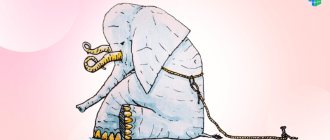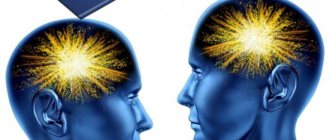Most of us are fairly tolerant of loud noises as long as they don't bother us too often and don't reach a level where the sound vibration is painful. We may experience a negative emotion, become indignant, or even try to influence the source of the loud noise, but nothing more. At the same time, there is a whole category of people for whom even a not very loud or sharp sound is categorically unacceptable and can cause not only irritation, but also anger, as a consequence of the resulting sonic boom.
This painful perception of loud sounds from the surrounding world is called hyperacusis or acoustic phobia. Although this condition is not a disease, the inconvenience caused does not contribute to a full life. Some especially sensitive people may even develop neurotic painful conditions due to the discomfort caused by such sounds.
Any familiar sound can become an irritant - the voices of children, the noise of cars, the hum of a vacuum cleaner, clapping, etc. As for sharp and loud sounds, for example, the sound of a working hammer drill, chainsaw, car horn, they can cause not just inconvenience or irritation, but real pain. It’s even worse for a person whose acoustic phobia develops to the stage when irritation arises from the slightest sounds - quiet music, the buzzing of insects, breathing sounds or the slightest rustle.
It is also worth noting such a phenomenon as misophonia, which differs from hyperacusis in that only certain sounds are perceived painfully, which do not cause a similar reaction in other people. It should be understood that the aggression and hatred of misophonics is not caused by familiar sound stimuli, for example, the creaking of foam on glass, a leaking dripping faucet, the squeal of car brakes, but the most harmless ones - a person can react extremely negatively even to the sound of footsteps, a knock on the door, human speech and etc.
What is misophonia
Misophonia is still not fully understood, so there are no systematic studies on this topic.
We can only be content with the relatively little information we have. So, misophonia manifests itself in an aversion to certain sounds. It is a neurological disease and experts believe it is caused by negative experiences or childhood trauma. It may occur due to the association of sound with an unpleasant memory. No, a screaming alarm clock in the morning and your reaction to it are not a manifestation of misophonia. But a constant trigger for clicking a pen is quite a sign of frustration. It all depends on how much the stimulus interferes. Let’s say if the grinding of metal causes panic, then this is the first alarm bell. The worst thing you can do in this situation is get angry and yell at the person making the noise. Accept that you will never destroy the sources, because murder is inhumane. Misophones tend to try to run away from their problem (literally). For example, they eat alone and always wear headphones. Some never remain in silence, because here the stimulus will be heard clearly and clearly. Another thing is a city where sounds mix into a monotonous mass. What is hell for healthy people is salvation for misophones.
What does it feel like to have misophonia?
Most often, people react acutely to the sounds of eating, chewing, and drinking made by others. It can also be the sounds of cutting nails, breathing, coughing, whistling, blowing your nose, and others. These sounds do not seem loud or harsh to most people, but are very audible to people with the problem. It is usually not single sounds that are annoying, but repeated sounds.
When triggered by sounds, people with misophonia may feel anger, disgust, and anxiety. In some cases it may be poorly controlled rage with a strong desire to avoid the situation. This is how an 18-year-old girl with severe misophonia describes her feelings, somewhat similar to a panic attack:
“My heart starts pounding. I have two types of reactions. I either cry or just get really angry. It's a really strong feeling. I mean, I feel like I’m going to die.”
Because the sounds that irritate these people are so common, misophonia can lead to social isolation. Suicide attempts due to this disorder have been described
What do the studies say?
Perhaps the most powerful specialists in the study of the disease today are American neuroscientists Pavel and Margaret Yastrebov. They came up with the term. The couple mainly deals with diseases that are associated with the hearing aid. Experts are even developing special devices that help people with tinnitus, a condition that causes noise in the ears. As for misophonia, the disease is young, it has been studied for no more than fifteen years, and clinical research is proceeding very slowly. But you can help them if you make a generous contribution: $10 million. This is how much, according to doctors, is needed to develop a therapeutic technique. In other words, if they are thinking about treatment, do they have an understanding of what to treat? Yes, but the research isn't the most reliable.
The first large-scale experiment to study misophonia was conducted in 2004 by clinical psychologist Monica Wu. 483 University of South Florida students took part. Its essence was a simple survey to identify symptoms. Doctors found that 20% of respondents showed significant deviations from triggers. The most interesting thing is that half of those who are diagnosed do not live a full life. This is about the fact that a person tries in every possible way to avoid irritating signals.
In 2011, an experiment was conducted in San Diego on a group of volunteers of 11 people. It was supervised by neurologist Vileyanur Ramachandran. The essence of the study was as follows: people were exposed to trigger sounds (chomping, grunting, snoring, Russian rap and sniffing). Everyone reacted equally negatively to what they heard, but the misophones were more irritated. Thus, they concluded that the disease manifests itself in increased excitability to normal processes. That is, your inadequate assessment of sounds is not always a manifestation of misophonia. So take a breath. Well, or be sad, if you like to invent illnesses for yourself. By the way, we talked about this habit earlier.
How to live with it
“In psychological practice, in particular in psychotherapy, there are approaches that explain the phenomenon of misophonia through neurotic (psychological) causes, and their nature comes down to a traumatic event,” Osipov told Izvestia. - Actually, like all psychological problems that are dealt with by practical psychology and psychotherapy. In psychological practice, they work with misophonia as if it were a trauma, and often successfully, but not always. Since the nature of this phenomenon is still not fully understood.
In his opinion, every person has misophonia to a greater or lesser extent and normally its manifestations are invisible.
— The problem becomes acute and noticeable when it causes painful emotional reactions. There are observations from which it follows that most often misophonia begins to develop between the ages of 7 and 10, and this is consistent with both the psychological approach to explaining the phenomenon and the physiological one.
Goodbye, cinemas, or what misophonia leads to
The disease is unpleasant because a person with misophonia is unable to lead a normal social life.
If the first symptoms appear in childhood, then, as a rule, parents, unaware of the disease, mistake the child’s complaints for whims. This gives the impression that no one understands you. In this case, things often come to the point of hysteria. As life progresses, the patient begins to accumulate more sounds that drive him crazy. Therefore, from birth to the age of 20, a misophone has a whole baggage of triggers. It turns out that a person is in constant stress, because you cannot escape from all the signals. Misophones try to avoid public places in everyday life. For example, cinemas are a kingdom of annoying sounds. At one end of the hall someone is reaching for the last of their juice, at the other they are chewing popcorn - danger is everywhere. A healthy person will not notice this, the sick person will become furious. Some people have problems finding partners. Here is a typical story of the owner of the disease:
“I lived with a girl for about six months, and the clicking of the mouse began to irritate me. Although I understand that these are everyday things, as without them.”
Dr. Schroeder, from the University of Amsterdam, says his patients experience severe symptoms, often to the point of loss of function. Returning to the 2011 study, it is worth mentioning that one of the subjects had thoughts of suicide. So there is no doubt that misophonia is a serious disease of the nervous system, and it must be dealt with using appropriate methods.
Scientists have found the cause of slurping intolerance
The cause of a pathological hatred of certain sounds - misophonia - may be abnormal brain function, researchers from Newcastle University have found. "Gazeta.Ru" got acquainted with the work published in the Journal of Neuroscience
.
Misophonia is a form of intolerance to certain sounds, from breathing, chewing or coughing to the sound of nails being cut. According to various estimates, from 6 to 20% of people in the world suffer from it. Although the range of possible irritating sounds is quite wide, most often misophonia is associated with sounds made when eating food.
In its mild form, misophonia is virtually uninterrupting, causing only some irritation, but with more severe symptoms it can make social interactions in the family, community and work impossible.
The mechanisms of misophonia have not been fully studied; various versions of the reasons for its occurrence have been put forward, including psychoanalytic theories. However, its real reason appears to be related to the way the brain works.
Using functional MRI, the authors analyzed the brain activity of 33 people with misophonia at rest and 42 while exposed to annoying sounds, and compared them with the results of a control group whose participants did not experience misophonia.
It turned out that in people with misophonia, in response to slurping and other sounds associated with eating, there is excessive activation of pathways connecting the auditory cortex with areas responsible for movements of the mouth and throat.
“We hypothesize that in misophonia, a certain stimulus activates these areas, even if it is just a sound,” says neurologist Sukhbinder Kumar, one of the authors of the work. “People feel like the sounds are invading them.”
In addition, a similar relationship was observed in the case of visual stimuli. This led Kumar and his colleagues to believe that stimuli trigger mirror neurons—nerve cells in the brain that are activated when an animal (primates, particularly humans, as well as some birds and insects have mirror neurons) performs an action and when watching someone else do it. This allows for faster learning through imitation, especially in the early stages of life. Mirror neuron dysfunction is considered a possible cause of some neurological diseases, such as autism spectrum disorder.
Although activation of motor neurons does not cause people with misophonia to chew or swallow, they do experience discomfort, likely related to a loss of sense of control over their body.
“Interestingly, some people with misophonia can reduce their symptoms by imitating actions that produce sound, which may indicate a regained sense of control.
Using this knowledge will allow us to develop new treatments for people with this disease,” says Kumar.
“The study provides new insights into treatment options for misophonia,” adds Professor Tim Griffiths, lead author of the paper. “Instead of focusing on the auditory centers of the brain, which is what happens in many existing treatments, the motor centers need to be taken into account.”
The mirror neuron system is trainable, Kumar explains. He hopes that a way can be found to break the connection between a particular sound and the unpleasant sensations it causes.
Interestingly, mirror neurons are equally
react both to a person chewing food and simply to the sound of eating. The highest levels of mirror neuron activation are seen in the same people who score highest on empathy tests.
But in people with schizophrenia, the functioning of mirror neurons is impaired
. Experiments have shown that patients with schizophrenia are more likely to make mistakes in tasks to imitate any action. Scans of their brains revealed that in schizophrenia, the activity of mirror neurons is reduced, which leads to errors. This disorder may underlie the communication problems experienced by people with schizophrenia.
Knock out a wedge with a wedge
The search for suitable therapy continues to this day, but today patients more often resort to self-medication, or rather, look for methods to suppress the reaction. For example, if someone is gnawing on seeds, then you can join the process, because misophone is not afraid of its own sounds. The element of ownership helps reduce the reaction to the trigger. Pavel Yastrebov uses a similar method in therapy; he calls it desensitization. The specialist reduces anger in the following way: the patient is immersed in a pleasant atmosphere, but with a source of irritation. For example, you are sitting eating pizza, and next to you is a person who is slurping loudly. The point is that the patient slowly gets used to it and his reaction changes. Here is what Yastrebov himself thinks about therapy:
“Misophonia can be successfully treated, but it is important to do it correctly.”
Moreover, in 2014 he helped 152 out of 184 people. However, there is work to be done, because the results are not yet close to 100% healing, and the treatment only reduced the manifestation of the disease. The goal of doctors today is to completely get rid of the disease. By the way, you should not resort to the use of drugs, since the nature of the disease is not completely clear. At this stage, the only thing the patient can do is to understand that he is not alone. Explain to loved ones that his behavior is normal. And also try to overcome the symptoms and wait for the next leap in medicine. Perhaps soon scientists will be able to rid humanity once and for all of another unpleasant disease.
What helps with misophonia
A major review of the scientific literature conducted in 2022 found that there are no treatments for this disorder with proven effectiveness. However, the Misophonia Institute indicates that cognitive behavioral therapy and a certain type of hypnotherapy can help with this disorder.
New discoveries about the connection between misophonia and motor neurons are giving scientists ideas for developing new treatments.
“Interestingly, some people with misophonia find it easier to tolerate symptoms by imitating actions that produce trigger sounds. Perhaps this brings back a sense of control over the situation,” Kumar explained. It is likely that new therapies will involve specific movements or manipulations of the motor regions of the brain.










